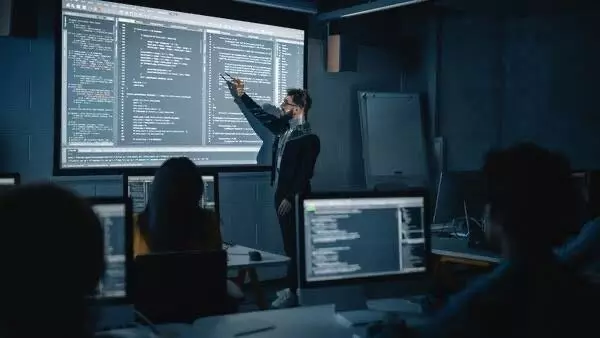Teachers' Day: Can AI replace teachers?
Unlike human teachers, AI tools are available 24/7
By Anoushka Caroline Williams
Teachers' Day: Can AI replace teachers?
Hyderabad: Every year, Teachers’ Day is a reminder of the enduring role of educators in shaping society. Yet, as classrooms adapt to technology, a new question arises: what happens when machines start teaching?
Artificial Intelligence (AI) is no longer a distant concept; it is present in adaptive learning apps, automated grading systems, and chat-based tutors. Students can now practice languages with AI-driven tools or receive instant step-by-step solutions to math problems.
This shift compels us to ask: can machines ever replace human teachers, or is their role fundamentally different?
What AI Does Well
Personalised Learning
AI systems excel at tailoring lessons to a student’s pace. By analysing data from repeated practice, algorithms can detect where a student struggles and adjust exercises accordingly.
Dr. Anirban Sen, education technology researcher, speaking to NewsMeter, says, “In large classrooms, personalisation is difficult. AI offers every student an individualised practice environment, something most teachers simply cannot manage on their own.”
Efficiency and Availability
Unlike human teachers, AI tools are available 24/7. They can check homework instantly, provide unlimited practice questions, and give immediate feedback, removing delays that often frustrate learners.
The Limits of Machines
Absence of Empathy
Despite technical strengths, AI cannot replicate the emotional support teachers provide. Children often turn to teachers not just for answers, but for reassurance and guidance.
Psychologist Dr. Meera Chandran explains, “Learning is not just cognitive; it is deeply emotional. A student who feels seen and encouraged learns better. Machines cannot offer that kind of recognition.”
Context and Ethics
AI may misinterpret cultural nuances, humour, or moral dilemmas. Human teachers help students navigate social issues, conflicts, and values, domains far beyond programmed responses.
The Teacher’s Evolving Role
From Instructor to Mentor
As AI takes over repetitive tasks like quizzes and drills, teachers are shifting focus to mentorship. They spend more time fostering creativity, critical thinking, and collaboration.
Educational consultant Rajesh Nair puts it this way: “The teacher’s job is moving from delivering content to helping students interpret, question, and apply knowledge. That is where human presence is irreplaceable.”
Partnership, Not Replacement
Rather than competing, AI and teachers can complement one another. A teacher supported by AI tools can track class progress more accurately, identify struggling students faster, and use classroom time for deeper engagement.
Looking Ahead
The future of education is likely hybrid, with AI handling efficiency, while teachers provide connection and wisdom. The balance will vary: in some contexts, AI tutors may fill gaps where schools are understaffed; in others, they will simply support overworked teachers.
As Dr. Chandran concludes, “AI can be a tutor, but only humans can be mentors. Technology should free teachers to be more human, not less.”
Conclusion
On this Teachers’ Day, it is clear that while machines can deliver lessons, it is teachers who inspire growth. AI may support education by making learning more accessible and efficient, but it cannot replace the compassion, guidance, and life lessons that only a human mentor can provide.
The challenge ahead is not about choosing between teachers and technology; it is about ensuring that AI strengthens, rather than diminishes, the vital human bond at the heart of education.